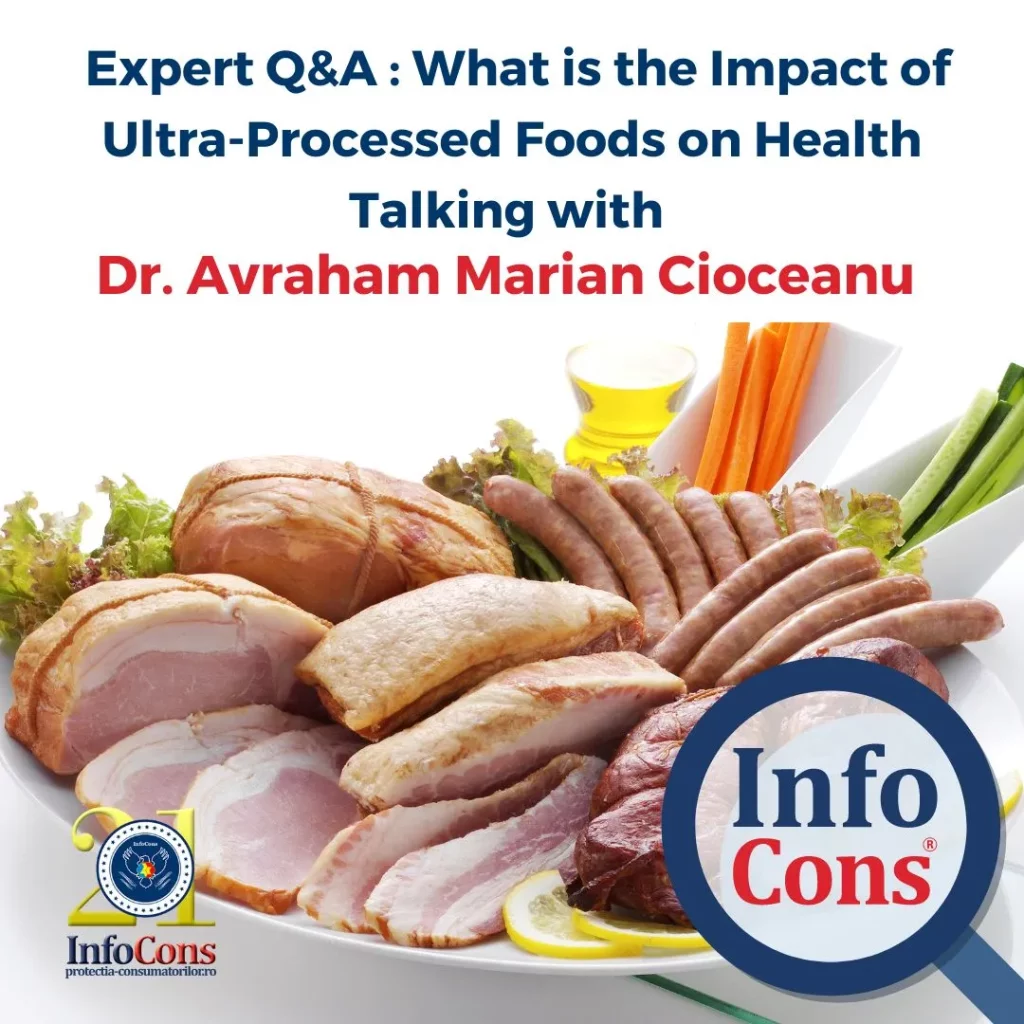
Ultra-processed foods have become a significant part of the modern diet. These foods, characterized by long shelf life, attractive packaging, and low cost, are produced through various industrial processes. Although they are accessible and extremely tasty, experts in the field warn us that their consumption is often linked to numerous health problems.
In the production of ultra-processed foods, ingredients synthesized in laboratories, such as artificial sweeteners, colorants, and flavors, are often used. These foods contain numerous additives to improve flavor, texture, color, and shelf life. Commonly used additives include emulsifiers, preservatives, stabilizers, and anti-caking agents.
Read also : Pay attention to Alerts for food products with the European InfoCons App !
We invited Dr. Avraham Marian Cioceanu – President of BIO Romania Association to discuss the topic of ultra-processed foods, a subject that raises many questions and for which we wish to provide informed answers to consumers.

Dr. Avraham Marian Cioceanu, a veterinarian by profession, has served as an advisor to the Minister of Agriculture, General Director of the National Agency for Agricultural Consultancy, and a university lecturer at the Ecological University of Bucharest. He has been a member of the European leadership council of the BIO Association, IFOAM-EU, since 2012 and established Romania‘s first food control laboratory.
The goal of the BIO Romania Association is to promote excellence in the field of organic agriculture to increase competitiveness in this field and achieve sustainable development of the rural environment, as well as to harmonize, represent, and defend the interests of operators in organic agriculture, both nationally and internationally. In the long term, the Association aims to develop its own organic production standard recognized at national and international levels.
- Are ultra-processed foods high in salt and sugar pleasing to the brain ? Can we talk about addiction ?
Dr. Avraham Marian Cioceanu – “Today, I believe that especially because of some food additives that create dependence, and because of sugar, which we know can lead to addiction when consumed in excess, we can say that some foods are pleasing to the brain. If we get used to eating salty, we want to eat even saltier. Our tastes change, and for this reason, I recommend that those who want to maintain or regain their health should turn to natural products and foods. This means foods that come directly from nature, clean, live food. This will help us keep our tastes unaltered, and then we won’t enjoy consuming any ultra-processed foods if we are accustomed to this type of natural food“.
Read also : What Do Food Labels Reveal? Why Is It Important to Read Them Carefully?
- Given that they are always available , tasty , and cheap , is it easier to consumethem excessively without realizing it ? What does excess mean ?
Dr. Avraham Marian Cioceanu – “Easy could come from the price because these foods are usually cheaper. Chemicals are added to the raw materials to retain water, making the product cheaper in the end. On the other hand, these ultra-processed foods are consumed in large quantities due to the phenomenon of addiction, of dependence.
Especially nowadays, when it’s no longer a secret or something unknown, you simply enter any ingredient on the label, coded like E222, for example, into Google, and you find a lot of information, clinical studies, and learn everything you are interested in. There are hundreds of studies; some additives are banned from being used due to these studies. But new ones are invented, and so on.”
Read also : EU’s Ecodesign for Sustainable Products Regulation and what we should know about it
- What is the impact on children’s healthif these ultra-processed foodsare found in their diet from an early age ?
Dr. Avraham Marian Cioceanu – “Recently, I was on a technical visit to a fast-food restaurant and was unpleasantly surprised to see a queue of teenagers, children, and parents with children eager to consume these fast-food products. You don’t see such a queue at any other type of restaurant, especially with children and young people, especially since 90% of the foods these restaurants sell are ultra-processed.
Besides fast food, I would also mention fruit yogurts, sweet ketchup, and street-corner pretzels. At the top of the list, by far, are all kinds of deli meats, especially the cheap ones like sausages, hot dogs, etc.
Statistically, years ago, the most obese teenagers were in the UK. The UK has since left the European Union, and now young people in Romania rank first in Europe for childhood obesity. It’s a disease that doesn’t just stand alone. The effects on the entire body are devastating, with obesity being closely linked to other chronic diseases such as cardiovascular diseases, diabetes, and nutritional disorders.
I recently read a study that said that by the age of 10, 1 extra kilogram is not noticeable, but this extra kilogram means 20 extra kilograms after the age of 40. When we see a child who is a bit chubby, maybe 3-4 kilograms overweight, we should think that if we don’t take timely measures, they could become a compromised adult.
In our country, prevention is not emphasized; treating diseases is. The prevention aspect should be much more active, and I don’t think there’s any preventive measure more important than the prevention of obesity in children. There is a need for deep, serious education, both in schools and in educating parents. Or maybe even before becoming parents, there should be training to understand what healthy eating means and the risks of ultra-processed foods “.
Read also : Expert Q&A : Talking with Mr. Vlad Gheorghe , President of OIPA , about the Impact of Ultra-Processed Foods on Health
- What is the impact of consuming ultra-processed foods on the healthand quality of life of the elderly ?
Dr. Avraham Marian Cioceanu – “I have known elderly people who are healthier than younger ones. Because they didn’t live through this highly chemically saturated era like today. Those who lived in the countryside and fed themselves with their own food from their yard or their neighbors’. For these people, it doesn’t even cross their minds to consume processed foods. Their bodies don’t accept this type of food because they weren’t exposed to it.
Then there’s the category of elderly people where, just by looking at them, you don’t need to be a doctor to realize that they suffer from multiple chronic diseases and are overweight, if not obese. Unfortunately, these individuals do not live to old age. And here, it’s about the impact of diet on health: strokes or myocardial infarctions, which are mainly due to animal fats in food but also to low water intake, insufficient hydration. At the cellular level, if we don’t drink enough water, the cell signals the liver for cholesterol, and the liver produces cholesterol to compensate for the lack of water in the body”.
Read also : What is the European Health Insurance Card and When Can It Be Used?
- Which categories of ultra-processed foods have the greatest impact on health?
Dr. Avraham Marian Cioceanu – “It’s very hard to rank them. It’s easy to grab a bottle of carbonated drink from the shelf, drink it immediately, rather than buying sausages, boiling them, and then consuming them. I would list carbonated drinks and cheap deli meats at the top, not as a statistic but based on what I observe as ultra-processed food consumption.
If we expand the discussion and say we don’t consume deli meats but eat ketchup or sauces that contain additives, sugar, fruit yogurt, and white bread, all these synthetic additives have a direct effect over time, even in small quantities. If we eat foods with additives, sugar, all kinds of chemicals for years, chronic effects set in, and we become ill. It’s a small dose of poison consumed daily, with long-term effects”.
Do you know what Food Additives are ? InfoCons Consumers Protection informs you !
- How can we change poor eating habits so that we incorporate more foodsthat are beneficial for healthand improve the quality of life ?
Dr. Avraham Marian Cioceanu – “The first step, without which there can be no positive result, is awareness! Informing and becoming aware that a particular food or ingredient in food makes us sick. But if we don’t know and don’t understand what excess means for each of us, what the ingredients in foods are that, when combined, can harm us, we are not on the right path.
White flour is equal to sugar. How much starch do we eat (white flour, pasta, potatoes, rice, etc.), and how much sugar from fruits do we consume? A natural apple or orange juice is a natural food, but the effect on the pancreas is identical due to the amount of sugar from the apple or orange that you suddenly introduce into your body. If you want to eat the same 2-3 oranges from which you made the juice, it takes a few minutes to peel and chew them, plus you also get the fibers from that fruit.
Read also : What Do Food Labels Reveal? Why Is It Important to Read Them Carefully?
In conclusion, we need to be informed about what is good for us and understand in-depth why it’s not good to consume ultra-processed foods, why they harm us, and what the long-term risks are. We read studies, and articles, listen to our bodies, understand what’s not good for us, avoid what we know is harmful, and focus on what truly nourishes us. We are in the summer season; let’s look for a relative or friend who might have farm animals, a garden, and from whom we can buy fruits, vegetables, cheese, eggs, and meat. Let’s consume seasonal foods characteristic of each season and stop looking for tomatoes in the middle of winter, cherries in spring from Chile or South Africa. Let’s buy cheap vegetables and fruits in autumn, freeze or preserve them, and consume them during the rest of the year” .
Read the label carefully: this helps you identify and avoid foods with excessive additives , salt, sugar, or saturated fats. Choose products with minimal ingredients.
The European InfoCons App provides you with the number of additives , ingredients, and quantities of salt and sugar , directly on your mobile phone . This information is essential for consumers , helping them make informed choices regarding products .
Article written by Cosmina Nițu
Master’s degree in nutrition and diversification consultant
Translated from Romanian by Andra Nițu
Master’s degree in communication sciences
InfoCons – European Organization for Consumer Protection and Promotion of Programs and Strategies , a full member of the World Organization Consumers International , founding member of the Federation of Consumer Associations , and member of ANEC .